If you have a bond portfolio or are thinking about building one, check our list of eight key considerations across the risk and return spectrum.
 The key consideration in constructing a fixed income portfolio is to identify the right balance of risk and reward and select appropriate investments to achieve that balance. Analysing an existing portfolio is a matter of revisiting that risk/reward balance to determine whether anything has changed in market conditions, investor risk appetite, or available securities.
The key consideration in constructing a fixed income portfolio is to identify the right balance of risk and reward and select appropriate investments to achieve that balance. Analysing an existing portfolio is a matter of revisiting that risk/reward balance to determine whether anything has changed in market conditions, investor risk appetite, or available securities.
Assess your risk
- Are you maintaining a good investment grade / sub-investment grade balance?
- Are you maintaining a good senior debt / subordinated debt balance?
- Does your portfolio exhibit good industry/issuer diversity?
- Is your portfolio appropriately balanced to minimise risk from interest rate and inflation changes?
- Are there any other risks in your portfolio (currency, mortgage backed security structures, call risk) and are they appropriate?

Generally, I would recommend investors hold at least 60 to 70% investment grade bonds. These bonds are considered low risk and as such, you can hold fewer large investments. High yield bonds are higher risk and will help boost overall portfolio returns. However, given their higher risk I would suggest investors hold a greater number of securities to increase diversification and invest smaller amounts per bond.
Similar portfolio percentages of 60 to 70% should be allocated to senior debt. As you move down the capital structure, you need to make sure you understand the terms and conditions of the securities and that the returns on offer adequately compensate you for the risk you are taking. My preference is to hold a greater proportion of subordinated debt compared to hybrids.

The greater the diversification in a portfolio, the better the protection it offers. Diversification can be assessed by considering industry, issuer and types of bonds held in a portfolio. A common over-allocation is to the financial institutions sector, where investors have multiple investments across the capital structure including: term deposits, senior bonds, hybrids and shares.
Assess your returns
- Are you getting paid for the risk you are taking?
- Are you getting appropriate income?
- Can you get better returns for similar risk?
For further information about fixed income or FIIG, you can speak to a FIIG Relationship Manager by calling 1800 01 01 81 or email us to ask a question or set up an appointment at info@fiig.com.au.
Copyright The contents of this document are copyright. Other than under the Copyright Act 1968 (Cth), no part of it may be reproduced or distributed to a third party without FIIG’s prior written permission other than to the recipient’s accountants, tax advisors and lawyers for the purpose of the recipient obtaining advice prior to making any investment decision. FIIG asserts all of its intellectual property rights in relation to this document and reserves its rights to prosecute for breaches of those rights.
Disclaimer Certain statements contained in the information may be statements of future expectations and other forward-looking statements. These statements involve subjective judgement and analysis and may be based on third party sources and are subject to significant known and unknown uncertainties, risks and contingencies outside the control of the company which may cause actual results to vary materially from those expressed or implied by these forward looking statements. Forward-looking statements contained in the information regarding past trends or activities should not be taken as a representation that such trends or activities will continue in the future. You should not place undue reliance on forward-looking statements, which speak only as of the date of this report. Opinions expressed are present opinions only and are subject to change without further notice.
No representation or warranty is given as to the accuracy or completeness of the information contained herein. There is no obligation to update, modify or amend the information or to otherwise notify the recipient if information, opinion, projection, forward-looking statement, forecast or estimate set forth herein, changes or subsequently becomes inaccurate.
FIIG shall not have any liability, contingent or otherwise, to any user of the information or to third parties, or any responsibility whatsoever, for the correctness, quality, accuracy, timeliness, pricing, reliability, performance or completeness of the information. In no event will FIIG be liable for any special, indirect, incidental or consequential damages which may be incurred or experienced on account of the user using information even if it has been advised of the possibility of such damages.
FIIG provides general financial product advice only. As a result, this document, and any information or advice, has been provided by FIIG without taking account of your objectives, financial situation and needs. Because of this, you should, before acting on any advice from FIIG, consider the appropriateness of the advice, having regard to your objectives, financial situation and needs. If this document, or any advice, relates to the acquisition, or possible acquisition, of a particular financial product, you should obtain a product disclosure statement relating to the product and consider the statement before making any decision about whether to acquire the product. Neither FIIG, nor any of its directors, authorised representatives, employees, or agents, makes any representation or warranty as to the reliability, accuracy, or completeness, of this document or any advice. Nor do they accept any liability or responsibility arising in any way (including negligence) for errors in, or omissions from, this document or advice. Any reference to credit ratings of companies, entities or financial products must only be relied upon by a ‘wholesale client’ as that term is defined in section 761G of the Corporations Act 2001 (Cth). FIIG strongly recommends that you seek independent accounting, financial, taxation, and legal advice, tailored to your specific objectives, financial situation or needs, prior to making any investment decision. FIIG does not make a market in the securities or products that may be referred to in this document. A copy of FIIG’s current Financial Services Guide is available at www.fiig.com.au/fsg.
An investment in notes or corporate bonds should not be compared to a bank deposit. Notes and corporate bonds have a greater risk of loss of some or all of an investor’s capital when compared to bank deposits. Past performance of any product described on any communication from FIIG is not a reliable indication of future performance. Forecasts contained in this document are predictive in character and based on assumptions such as a 2.5% p.a. assumed rate of inflation, foreign exchange rates or forward interest rate curves generally available at the time and no reliance should be placed on the accuracy of any forecast information. The actual results may differ substantially from the forecasts and are subject to change without further notice. FIIG is not licensed to provide foreign exchange hedging or deal in foreign exchange contracts services. The information in this document is strictly confidential. If you are not the intended recipient of the information contained in this document, you may not disclose or use the information in any way. No liability is accepted for any unauthorised use of the information contained in this document. FIIG is the owner of the copyright material in this document unless otherwise specified.
The FIIG research analyst certifies that any views expressed in this document accurately reflect their views about the companies and financial products referred to in this document and that their remuneration is not directly or indirectly related to the views of the research analyst. This document is not available for distribution outside Australia and New Zealand and may not be passed on to any third party without the prior written consent of FIIG. FIIG, its directors and employees and related parties may have an interest in the company and any securities issued by the company and earn fees or revenue in relation to dealing in those securities.